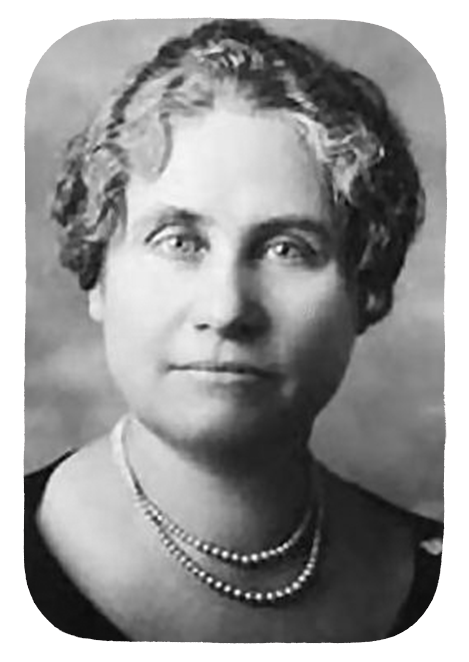
Additional Resources
Alice Louise Reynolds,
Advocate for women’s opportunities
1873-1938
by Rebekah Clark
Historical Director, Better Days
For Alice Louise Reynolds, education was the center of her life, books were her passion, and the advancement of women was her mission. As the first female to be a full college professor at Brigham Young University, this suffragist devoted her time to mentoring students, continuing her own studies, and advocating for women’s opportunities both within the classroom and throughout the nation. Her life was characterized by academic excellence, path-breaking accomplishments, lifelong learning, and commitment to improving the lives of women.
Alice was born in Salt Lake City in 1873 to George Reynolds and Mary Ann Tuddenhaum.[1] Her parents emphasized education and enrolled her in private school at the early age of four. Following her mother’s death, she left home to study under Karl G. Maeser at Brigham Young Academy just before her thirteenth birthday. She graduated from the Academy in 1890, briefly taught in the Salt Lake City schools, and then studied literature at the University of Michigan from 1892 to 1894. She returned to Provo, accepted a faculty position teaching theology and literature at Brigham Young Academy, and taught the first Shakespeare and Chaucer courses offered there.

Faculty of Brigham Young Academy, 1902. Alice Louise Reynolds is in the center of the middle row, next to acting president George Brimhall. Courtesy of L. Tom Perry Special Collections, Brigham Young University.
Alice was called “the pioneer in literature at the Brigham Young University.”[2] From 1894 until her death in 1938, Alice was a Professor of English at Brigham Young University (BYU) or its predecessor Brigham Young Academy. In 1911, she became the first woman to become a full professor at BYU as well as the first woman to deliver a BYU Founders Day address. She also served as the committee chair of the BYU library for nineteen years and was intensely devoted to building the library and overseeing the collection of over 100,000 volumes. Alice continued her own education throughout her life. She earned three bachelor degrees, spent her summers doing graduate work at Cornell, Columbia, Berkeley, University of Chicago, and Queen’s College in London, and travelled extensively throughout Europe.

Dedication of the Heber J. Grant Library at Brigham Young University on October 16, 1925. Alice Louise Reynolds, center, was instrumental in obtaining the new building, which was the first BYU building in fifty years to serve completely as a library. Courtesy of L. Tom Perry Special Collections, Brigham Young University.
In addition to her academic pursuits, Alice dedicated her abundant energy and talents to leadership in political, social, and religious organizations. Much of her political work involved public speaking and persistent lobbying for suffrage and for legislation to improve conditions for women. As a Utah delegate at the 1904 General Federation of Women’s Clubs convention in St. Louis, she faced attacks attempting to discredit Utah’s suffrage. She responded with a powerful three-minute rebuttal, eloquently affirming that she voted her convictions and that her church did not dictate women’s politics. An active member of the National American Woman Suffrage Association (NAWSA), she served as a Utah delegate to four NAWSA conventions, including the Jubilee convention in 1919, and as president of the League of Women Voters in Utah after suffrage was obtained. She lobbied in Washington, D.C. on behalf of the federal suffrage amendment in 1916, appeared on a program for suffrage in San Francisco with William Jennings Bryan, and spoke at a mass meeting for the National League of Women Voters in the Salt Lake Social Hall theatre in 1920. That year she also ran for the Utah State Legislature, and although she lost the election, NAWSA’s History of Woman Suffrage listed her as one of the “leading women” of Utah’s Democratic party.[3] She served on the national Democratic committee and as a delegate to the National Democratic Convention in 1920, where she made a speech seconding the nomination for the presidential candidate. She also represented Utah at conferences for the National Education Association, National Council of Women, and Pan-American Conference of Women Voters. She served on the General Board of the Relief Society for seven years and was editor for the Relief Society Magazine from 1923 to 1930.

“Suffrage Special” on its return to Washington D.C., with envoys of voting women to U.S. Congress on May 16, 1916. Left to right: Mrs. C. S. Haire, Montana; Mrs. Wallace Williams, Washington; Miss Alice Reynolds, Utah. Courtesy of National Woman’s Party.
Alice Louise Reynolds died of cancer in 1938. She never married, but she once stated that her friends were as dear to her as a husband or children could be. Students were so inspired by her example and influence that they formed the Alice Louise Reynolds Club, with over a dozen nationwide chapters dedicated to literary studies, intellectual discussions, collecting books for the BYU library, and the promotion of woman’s rights. Today, BYU’s Harold B. Lee Library honors her legacy with a reading room named in Alice’s honor.
Rebekah Clark was Historical Research Associate at Better Days when she wrote this bio.
Footnotes
[1] George Reynolds, a general authority of the Church of Jesus Christ of Latter-day Saints and secretary to the First Presidency, was the defendant in the Reynolds v. U.S. plural marriage test case in which the United States Supreme Court held that religious belief was not a defense to criminal laws. He was imprisoned for two years when Alice was six years old.
[2] Elsie C. Carroll, “Alice Louise Reynolds,” The Young Women’s Journal, v. 33 n. 6 (June 1922), 326.
[3] Provo Herald, November 4, 1920; History of Woman Suffrage, vol. 6, ed. Ida Husted Harper (J.J. Little & Ives Co.: New York, 1922) 649.

